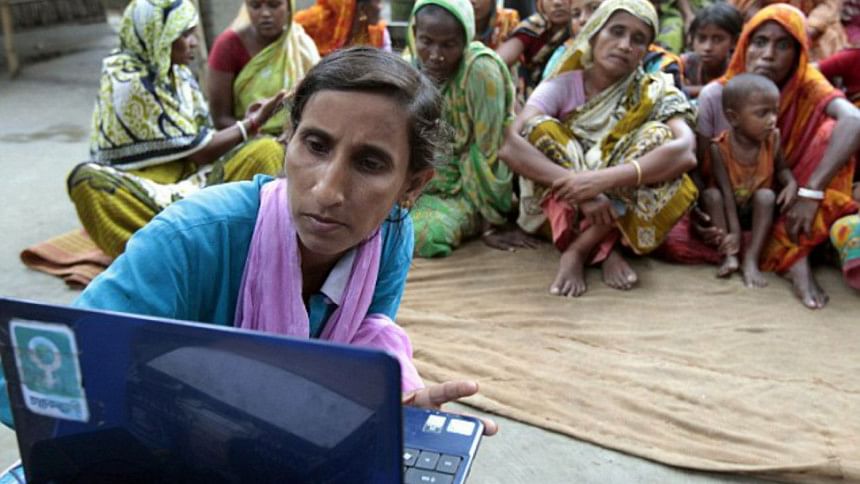Financial Inclusion - More Than Money

In early September, I travelled to New York for the Sustainable Development Summit at the UN. There, a sweeping new global development agenda was adopted by 193 countries, including Bangladesh and my own country, the Kingdom of the Netherlands. This plan, which will serve as a blueprint for development efforts for the next 15 years, addresses far-reaching concerns including ending poverty, hunger, and gender inequality; ensuring good health, education, and work; and protecting the natural world in all its complexity.
These new Sustainable Development Goals are ambitious, but what I encountered at the UN was hope and a profound sense of purpose. And what I heard from leaders around the globe was a growing commitment to prioritising financial inclusion as a vital tool for achieving these goals—not as an end itself but a powerful means to an end.
Financial inclusion isn't just about money—it's about opening up a path to opportunity. Providing the poor with the financial tools they need to protect themselves against hardship, invest in their futures, and build the lives they want can contribute significantly to creating a sustainable world that works for all.
As the UN Secretary-General's Special Advocate for Inclusive Finance for Development, I've been working to expand access to financial services for the poor for many years. And it is immensely gratifying to see national and international leaders take up the issue more purposefully, including the government of Bangladesh.
Why are leaders investing in this cause now? Forty percent of the world's adults—2 billion people—struggle to get by without the basic financial services they need. But today, we have an unprecedented opportunity to expand access thanks to a variety of innovative tools such as digital and mobile technology.
In Bangladesh, financial services are already changing lives in many different ways. When a garment worker in Dhaka receives a paycheck directly into a digital account instead of in cash, she is assured of getting her full wage and can securely set aside funds for important needs such as her children's education. When a farmer in Satkhira district obtains crop insurance, he can ensure his family's welfare even if floods or other calamities devastate his fields. When a construction labourer working in Dubai safely sends money home to his family in Kalai through a digital account, without paying exorbitant fees, his hard-earned salary can go further to feed, clothe, and provide for his relatives.
Bangladesh has a time-honoured history of innovation when it comes to financial inclusion. As one of the cradles of modern microfinance, Bangladesh helped invent the very concept. Today it continues to play a leadership role, particularly with digital financial services. Its most successful mobile money provider, bKash, is a prime example of how to make and distribute pro-poor financial tools that customers trust and adopt as a regular part of their daily lives.
But Bangladesh can go even further in increasing access to financial services, especially for women. Whereas 33 percent of men have an account at a financial institution, only 25 percent of women do, a disparity that reflects a worldwide challenge. Closing this gap will certainly help achieve gender equality, one of the Sustainable Development Goals. But it will also help improve the well-being of families—in fact, multiple studies have shown that when women control household income, they direct more of it toward family needs such as food, health, and education.
I am happy to say that the Bangladesh government is facing its financial inclusion challenges head-on and is making plans that will allow the country to significantly expand financial access for the poor. At this very moment, the national bank is drafting guidelines that will shape the market for mobile financial services so that new providers can make vital services available to the people who need them.
The preparation of a national financial inclusion strategy is also being contemplated. Establishing a formal strategy has been shown to generate significant advances in financial inclusion. For Bangladesh, this could be an important undertaking between multiple government offices and a wide range of public and private organisations. A joint commitment to establish a well-coordinated plan and translate it into action could give an additional boost to the complex work of financial inclusion.
I have no doubt that the goal of universal financial inclusion is within reach. In the past three years, 700 million people have gained financial access, a remarkable 20 percent increase. As we push forward to reach the 2 billion who remain excluded, Bangladesh has been recognised as a key country where progress can have a great impact. What happens here can shape what will happen elsewhere.
By adopting the Sustainable Development Goals, the world has committed itself to vision of equality and sustainability that will require hard work, collaboration, and persistence. But to reach these goals, we need to rapidly put in place the foundations on which progress can be built. And one of the most important of those building blocks is financial inclusion.
It is deeply encouraging to see that Bangladesh has responded to this challenge and is taking steps to deepen financial inclusion for the poor. It will not be a simple process, but as 193 countries recognised at the UN, that's how lasting change happens—goal by goal, step by step. The benefits for millions of Bangladeshis could be enormous.
The writer is HM Queen Máxima of the Netherlands, United Nations Secretary General's Special Advocate for Inclusive Finance for Development.

 For all latest news, follow The Daily Star's Google News channel.
For all latest news, follow The Daily Star's Google News channel. 



Comments